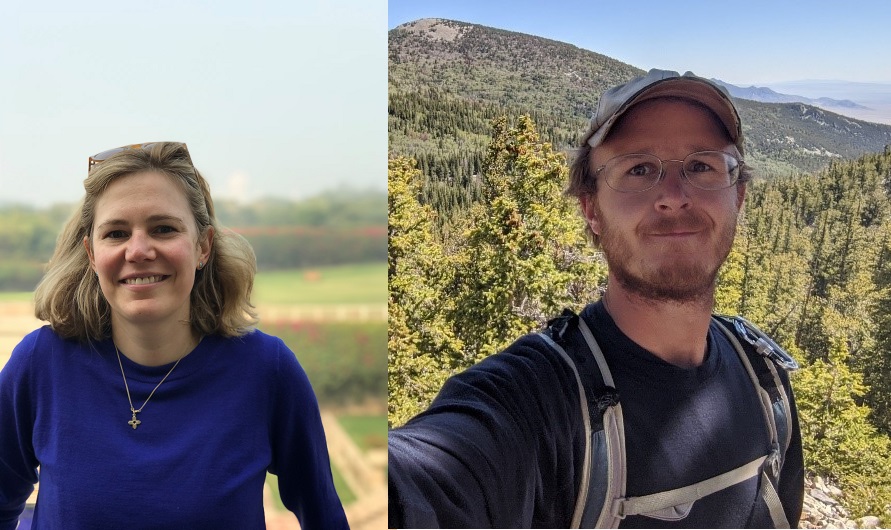
Rachel Pasternack and Ethan Belair
Rachel Pasternack and Ethan Belair
Senior Advisor / Natural Climate Solutions Forester - The Nature Conservancy / The Nature Conservancy Global Climate Science Team
Building It Right: Understanding Potential Forest Impacts from Mass Timber Construction
October 07, 2021 - 11:00 AM
Recent work has highlighted the potential for mass timber products such as cross-laminated timber to deliver a suite of environmental and economic benefits across the forestry and construction sectors. Potential changes to wood markets, forest management strategies, or forest carbon stocks are a key part of assessing the impacts of mass timber on forests, but have not been the topic of significant research to date. There is uncertainty surrounding whether optimal forest policy should favor minimizing wood harvest to maintain carbon storage, or development of new markets for long‐lived wood products to support forest‐dependent economies and maximize potential sequestration rates. Furthermore, under either scenario critical safeguard frameworks are needed to mitigate impacts on biodiversity and other ecosystem services.
The Nature Conservancy is investigating how potential increases in mass timber production could affect forests, as well as potential safeguards to mitigate negative impacts. Two current research projects will be discussed at the Yale Forest Forum Seminar.
- TNC is coordinating a multi‐institution collaboration to quantify the potential impact of increased demand for mass timber on the forest products markets and greenhouse gas emissions globally. This project includes five distinct phases:
- Comparative life-cycle assessments (LCAs) of paired, functionally equivalent, mass timber- and traditional materials-buildings;
- Region-specific modeling of market penetration and the resulting impact on demand for mass timber buildings;
- Assessment of the impact on global forest products trade caused by increased demand for mass timber;
- Region-specific evaluation of the impact of changes in global trade on forest management standing forest carbon stocks;
- Integrated assessment of environmental and economic tradeoffs of potential increases in the use of mass timber, with consideration of the likelihood of various outcomes.
- With close partners, we are developing stakeholder perception interviews and surveys to assess if there are additional safeguards considerations that are unique to mass timber, and ultimately, a climate smart forest economy. We will develop a set of global guiding principles to mitigate potential unintended consequences and impacts to forest ecosystems.
Our goals in initiating these projects are the identification of safeguards and best practices that can be used to ensure sustainable, ecologically-sound use of forests, while allowing for continued growth of an important, emerging forest products market.
Acknowledgements:
This project is supported through the generous support of Good Energies Foundation, The Climate and Land Use Alliance, the Doris Duke Charitable Foundation, and the USDA Forest Service, Forest Products Laboratory, Forest Products Marketing Unit (17-CA-11111169-031). This inherently collaborative research has been conducted by excellent partners at Michigan State University, the University of North Carolina, University of Washington, USDA Forest Service, Bank of Canada, Atelier Jones LLC, BTG Pactual Timberlands Investment Group, Exeter University, Coldstream Consulting, Woodworks, the Consortium for Research on Renewable Industrial Materials, and the Climate Smart Forest Economy Program.
Speaker Biographies
Rachel Pasternack, Senior Advisor, Natural Climate Solutions, The Nature Conservancy
Rachel is a Senior Advisor on Natural Climate Solutions, at TNC. She currently works on the Global Tackle Climate Change team at TNC, promoting nature (i.e. restoration and avoided forest loss) as a tool for climate mitigation. She holds a Master in Public Administration from the London School of Economics, London, UK, and a BAS with honors from the University of New Mexico, Albuquerque, New Mexico, USA. Rachel has a wide array of experience working on sustainable development; building public, private partnerships; and developing and implementing environmental policy in the UK, the US, and Latin America. She has worked for organizations such as The Nature Conservancy; The United States Senate Committee on Energy and Natural Resources; The United States Executive Office of the President, Office of Management and Budget; and various global charities, notably the World Bank.
Ethan Belair, Natural Climate Solutions Forester, The Nature Conservancy Global Climate Science Team
Ethan Belair is the Natural Climate Solutions Forester with the Nature Conservancy’s Global Climate Science Team, which studies the impacts of implementing natural climate solutions (link is external), primarily in forests. His current work focuses on measuring and modeling how forests respond to human interventions from local to global scales. He is an affiliate faculty member at the University of New Hampshire, where he previously worked as a faculty member and extension forester. His prior work has centered on improving the practice of silviculture in forest management, and has included elements of forest biometrics, wildlife habitat improvement, remote sensing, and human demographics. He holds an M.S. in Forest Biology from Purdue University, and a B.S. in Forestry from the University of New Hampshire.